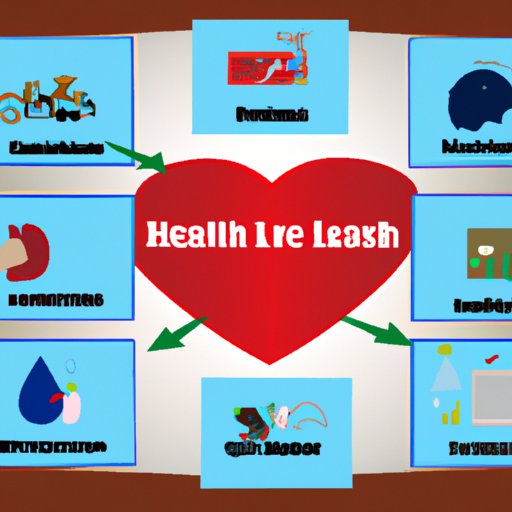Introduction
Heart health is an important aspect of overall health, as it affects your ability to work, socialize, and lead a full life. Taking steps to maintain heart health can help prevent serious complications such as heart attack and stroke. In this article, we’ll explore what you can do to keep your heart healthy and reduce your risk of cardiovascular disease.
Exercise Regularly
Regular exercise is an essential part of maintaining heart health. Exercise helps to improve circulation, strengthen the heart muscle, and lower blood pressure. It also helps to reduce stress levels, which can have a positive effect on heart health. The American Heart Association recommends at least 150 minutes of moderate-intensity aerobic activity or 75 minutes of vigorous-intensity aerobic activity each week, in addition to two strength-training sessions.
Types of exercise that are beneficial for heart health include walking, jogging, swimming, biking, and resistance training. Before beginning any exercise program, be sure to talk to your doctor to make sure it’s safe for you.
Manage Stress Levels
Stress can have a negative impact on heart health, so it’s important to find ways to manage stress levels. Understanding how stress affects the body can help you to recognize when you’re feeling overwhelmed and take steps to reduce stress. Common signs of stress include difficulty sleeping, changes in appetite, irritability, and fatigue.
Tips for reducing stress levels include taking time for yourself, practicing relaxation techniques such as yoga or meditation, and talking to a friend or family member. Regular exercise can also help to manage stress levels.
Eat a Healthy Diet
Eating a healthy diet is another key component of maintaining heart health. Eating a balanced diet that includes a variety of fruits, vegetables, lean proteins, and whole grains can help to reduce cholesterol and blood pressure levels. It’s also important to limit saturated fats, trans fats, and sodium, as these can increase your risk of heart disease.
Nutrients that are important for heart health include omega-3 fatty acids, magnesium, potassium, calcium, vitamin D, and fiber. Incorporating foods that are rich in these nutrients into your diet can help to keep your heart healthy and reduce your risk of cardiovascular disease.
Maintain a Healthy Weight
Maintaining a healthy weight is another important factor in promoting heart health. Being overweight or obese can increase your risk of high blood pressure, high cholesterol, and type 2 diabetes, all of which can lead to heart disease. If you are overweight or obese, it’s important to take steps to achieve and maintain a healthy weight.
Tips for achieving and maintaining a healthy weight include eating a balanced diet, exercising regularly, and tracking your progress. If you need additional help, talk to your doctor about developing a weight loss plan that is tailored to your individual needs.
Avoid Smoking and Drinking Alcohol
Smoking and drinking alcohol can have a detrimental effect on heart health. Smoking can damage the lining of the arteries and increase the risk of blood clots, while excessive alcohol consumption can increase blood pressure and lead to heart failure. If you smoke or drink, it’s important to take steps to quit or reduce your consumption.
Tips for quitting smoking include setting a quit date, avoiding triggers, and seeking support from friends and family. If you choose to drink alcohol, it’s important to do so in moderation. For men, this means no more than two drinks per day, and for women, no more than one drink per day.

Monitor Your Blood Pressure and Cholesterol
It’s important to monitor your blood pressure and cholesterol levels regularly, as high levels of either can increase your risk of heart disease. Blood pressure should be checked at least once a year, and cholesterol levels should be checked every four to six years. If your levels are high, your doctor can recommend lifestyle changes or medications to help bring them back to a healthy range.
Measuring your blood pressure and cholesterol levels is easy and painless. You can measure your blood pressure at home with a digital blood pressure monitor, or you can have it done at your doctor’s office. Cholesterol levels can be measured with a simple blood test.
Get Regular Check-Ups from Your Doctor
Getting regular check-ups from your doctor is an important part of maintaining heart health. During a check-up, your doctor will review your medical history and perform tests to check your blood pressure, cholesterol levels, and other markers of heart health. This can help to identify any potential problems early, when they may be easier to treat.
Your doctor may also recommend certain lifestyle changes or medications to help reduce your risk of heart disease. It’s important to follow your doctor’s instructions and attend follow-up appointments as recommended.
Conclusion
Keeping your heart healthy is essential for living a long and healthy life. Steps you can take to maintain heart health include exercising regularly, managing stress levels, eating a healthy diet, maintaining a healthy weight, avoiding smoking and drinking alcohol, monitoring your blood pressure and cholesterol, and getting regular check-ups from your doctor. Taking these steps can help to reduce your risk of heart disease and ensure that your heart remains healthy for years to come.
(Note: Is this article not meeting your expectations? Do you have knowledge or insights to share? Unlock new opportunities and expand your reach by joining our authors team. Click Registration to join us and share your expertise with our readers.)
